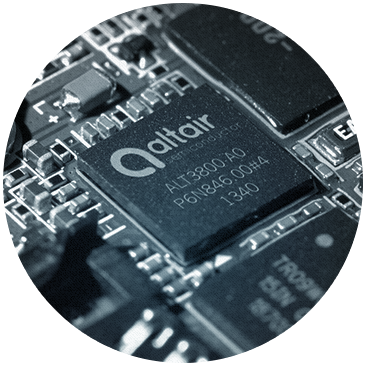Smaller than traditional companies, startups are designed to develop new markets and emphasize an efficient approach to business operations.
Many startups have failed, but many have also achieved phenomenal success. One of the biggest challenges for startups is competing with larger, more established businesses. However, in today’s world size no longer predicts success.
Here at Fueled, we’ve found three startups that were able to disrupt larger competitors and transform their respective markets.
Altair Semiconductor
When Altair Semiconductor struck a deal with Google and Hewlett Packard to install its chipset into Chromebooks, it was a big win for the startup company. But more significant was the fact that in doing so, Altair beat out one of the largest semiconductor companies – the San Diego based Qualcomm.
Altair Semiconductor manufactures 4G (LTE) chipsets that are used in a variety of devices. Without burdening itself with extra 3G capability, the chipset is more efficient than those that are. Qualcomm, on the other hand, has 2G, 3G, and 4G patents in addition to numerous other digital products.
This successful partnership has positioned the Israeli startup into a new level of competitiveness. Because it proved that it could compete with the “big boys,” Altair will have to continue to sweep them under the rug. We don’t think that’ll be much of a problem.
Kickstarter
Kickstarter has transformed a variety of industries, from manufacturing to entertainment, by putting full control of projects into the hands of its users.
Formed in 2009, Kickstarter is a crowdfunding website that allows anyone to raise funds for project development. It has helped entrepreneurs and artists achieve goals that would have otherwise required financial backing from much larger companies. The startup has raised over $250 million for over 20,000 projects.
Amazing things have happened, like the Veronica Mars movie that no studio would pick up, was the fastest project to reach $2 million and had the most backers of any project to date. The movie was recently released to rave reviews and would’ve never happened if Kickstarter hadn’t been there to save the day.
Lyft
Lyft achieved its success because of the growing “sharing economy.” The San Francisco-based company created an app to allow users in need of transportation to request a driver. Drivers are background checked and approved by Lyft before being added to the app. Both passengers and drivers are covered by a million dollar insurance policy that is the only one of its kind. Drivers actually rate passengers, rather than vice versa, to help other drivers know whether to pick up certain individuals or not.
19 cities that include San Diego, Los Angeles, Boston, and New York are a part of Lyft’s offering. Plans are in development for expansion in both the domestic and international markets.
With over 100,000 users, Lyft has successfully disrupted other public transportation services, specifically taxis. The startup was met with a significant backlash from cab drivers that saw Lyft as a threat to their livelihood. This small startup certainly shook up a long-standing and tightly regulated industry.
How Startups Do It
Small startups disrupting big competitors is not new in Silicon Valley. Many of the largest companies today started out as small organizations. Companies such as Microsoft, Facebook, and Salesforce were all startups that transformed their respective industries. Did you think that taxi cabs were an industry that couldn’t be disrupted? Rideshare services like Uber and Lyft changed the way we get to and from the airport, hotels, restaurants, bars, and even our friends’ houses. Do you think scientific lab equipment is safe from disruption? Read more about how a company called Excedr is disrupting how labs go about getting the equipment that they need.
Large companies are difficult to compete with. They have the resources to monopolize distribution channels and launch expensive marketing campaigns. But bigger is not always better. In fact, smaller usually means faster. Startups have opportunities available to them that previously could not have been imagined.
They can direct their full energy and efficiency into competition. Startups avoid internal conflicts over resources and delays over decision-making. Big companies just can’t match the agility that startups inherently possess. As more startups continue to rise in today’s economy, big companies will have to continue to look over their shoulders.
By Ilan Nass. Fueled is New York’s leading mobile app development.
Image Credit: altair-semi.com, www.forbeck.com, www.keetria.com







